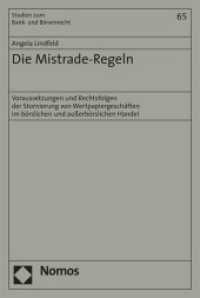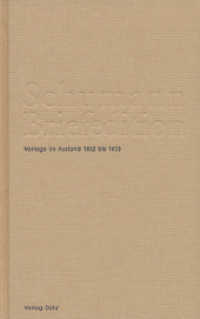- ホーム
- > 洋書
- > 英文書
- > Performing Arts
Full Description
Fifty years of feminist thought have made the idea that women stay at home while men dominate the streets seem outdated; nevertheless, Ceuterick argues that theoretical considerations of gender, space, and power in film theory remain limited by binary models. Looking instead to more fluid models of spatial relations inspired by Sara Ahmed, Rosi Braidotti, and Doreen Massey, this book discovers wilful, affirmative, and imaginative activations of gender on screen. Through close, micro-analysis of historic European Messidor (Alain Tanner, 1979) and contemporary world cinema: Vendredi Soir (Claire Denis, 2002), Wadjda (Haifaa Al-Mansour, 2012), and Head-On (Fatih Akin, 2004), this book identifies affirmative aesthetics: light, texture, rhythm, movement and sound, all of which that participate in a rewriting of bodies and spaces. Ultimately, Ceuterick argues, affirmative aesthetics can challenge the gender categories and power structures that havebeen thought to determine our habitation of cars, homes, and city streets. Wilful women drive this book forward, through their movement and stillness, imagination and desire, performance and abjection.
Contents
1. Introduction: Affirmative ethics, wilfulness, and affects as forms.- 2. Urban wanderer and wilful performances: Head-on (Gegen die wand).- 3. Housing wilfulness: Wadjda.- 4. Lived body, affects and cars: Friday night (Vendredi soir).- 5. Conclusion: Affirmative aesthetics.








